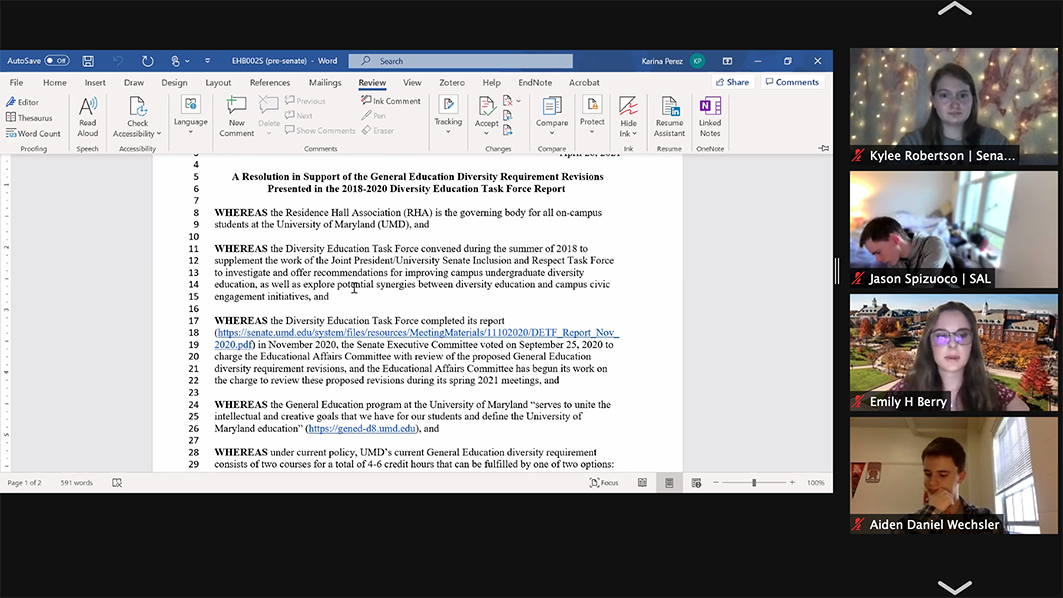The University of Maryland RHA Senate passed three resolutions Tuesday night, including a resolution that renewed the body’s Resident and Police Committee, along with legislation that supported revisions to the general education diversity requirements.
Over the course of this academic year, the Resident and Police Committee has met five times to discuss the 1033 program — which provided military-grade equipment to the campus police force — and the 25 demands created by Black student leaders, among other topics.
The RPC is the body’s only ad-hoc committee, which means that unlike standing committees, senators vote on the committee’s potential reinstatement at the end of the academic year. The resolution to renew its ad-hoc status for the 2021-22 academic year, written by Hunter Marsh, passed 16-2 with no abstentions.
Launched in 2019 after the passage of a resolution by current chair Marsh, the committee sets out to discuss University of Maryland Police Department operations, address resident concerns about policing and create programming initiatives for dorms, such as dialogues with University Police. The committee did not continue meeting last spring after campus shut down.
“This committee is heavily centered on being in person, because that’s what policing on campuses is,” said Marsh, a senior government and politics major.
[UMD Student Affairs VP Patty Perillo talks vaccine distribution, fall plans at RHA meeting]
Sarah Dresh, the programming and community development coordinator, asked how RPC differed from the Student Government Association’s UMPD Student Advisory Committee. The SGA committee, which was created in February, includes representatives from the RHA, the Graduate Student Government and Black Alliance Network, among others.
“That committee is a broader representation of the campus of large, not just residential students,” Marsh said. “That committee has a better chance at serving all students that go on campus.”
Vice President-elect Mel Mader advocated for reinstating RPC to represent the views of residential students. Although the SGA committee has a broader reach, Mader said, it may be too broad.
“The reason RHA exists is to express the interests of resident students on campus,” the sophomore English and theatre major said. “I don’t think that an SGA committee would have given that the time that the committee wanted because they have so many other interests going on.”
The RHA also passed two resolutions written by President Emily Berry: one in support of general education diversity requirement revisions, and another in support of incorporating the consideration of “compelling circumstances” into the student conduct sanctioning process.
Berry’s first resolution, passed 15-2-1, supports revising general education diversity requirements as presented in a November 2020 diversity education task force report.
This university’s current general education diversity requirement consists of two courses that can be fulfilled by one of two options: either two courses that meet Understanding Plural Societies (DVUP) learning outcomes, or one DVUP course and one that meets Cultural Competence (DVCC) learning outcomes.
Most students fulfill the diversity requirement by taking two DVUP courses, which are designed to teach theory rather than emphasize practice and behavioral outcomes, according to the resolution.
[RHA votes to support state bill requiring UMD to be carbon neutral by 2035]
The proposed revisions would retain the two-course system but rename the DVUP category to “Understanding Structures of Racism and Inequality,” which would focus on systemic racism, and rename the DVCC category to “Navigating Diverse Social Environments,” which would have a larger set of behavioral learning outcomes, including communicating and working across social groups.
According to the report, the new learning outcomes ensure students will “grapple with the problems of systemic racism, which is timely and has been [a] historic oversight on this predominantly [w]hite campus in a former slave-holding state.”
Freshman electrical engineering major Scott Fleischmann voiced concerns that the changes would be “too restrictive.”
“I’m hoping that it focuses more on … not just racism but also things like sexism and LGBTQ representation and classes that focus on those as well,” he said. “Those are currently under the [DV]UP categories, and I’m hoping that those are covered under inequality.”
Berry pointed out that although the Understanding Structures of Racism and Inequality category focuses on systemic racism, the Navigating Diverse Social Environments category leaves more room for intersectionality and related conversations.
“The Navigating Diverse Social Environments [category] … talks about empathizing with the experiences of individuals who’ve been marginalized, and … communicating with others from different social backgrounds,” the senior economics and government and politics major said.
Berry’s second resolution of the night which encouraged the University Senate to explore a change in policy to incorporate considering students’ “compelling circumstances,” into the student conduct sanctioning process, passed unanimously with 18 votes. In some cases, Berry wrote, the impacts of certain sanctions can disproportionately hurt some, such as those without housing alternatives or international students.



